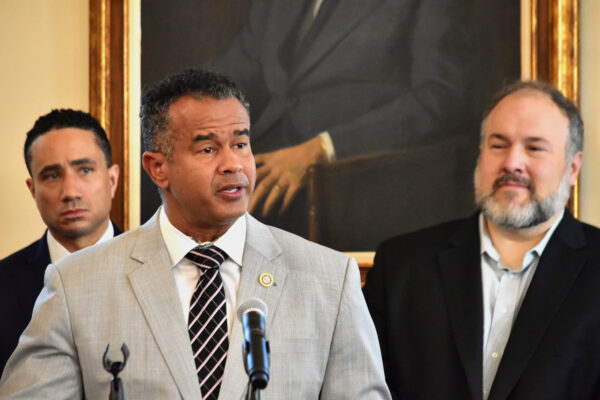Moore signs first bills, praises Del. Wilson’s work for survivors of sexual abuse

Gov. Wes Moore (D) conducted his first bill signing Tuesday with two of his major priorities — accelerating the minimum wage a year earlier and providing tax credits to help low-income families — signed into law.
The Fair Wage Act will accelerate the state’s current $13.25 per hour minimum wage to $15 starting in January versus the previous timetable of 2025.
The Family Prosperity Act permanently extends the state’s earned income tax to offer both refundable and nonrefundable credits against the state income tax. Also it expands the state’s child tax credit to taxpayers who have children aged 5 years and younger and whose federally adjusted annual gross income is $15,000 or less, effective June 1.
“Both of these bills will give [residents] just a little extra cushion to pay for diapers, to get food on the table, to get ahead on next month’s rent, to maybe take your family out to dinner,” Moore said inside the State House.
After he signed those bills into law, Moore stopped to give special recognition to Del. C.T. Wilson (D-Charles County).

Del. C.T Wilson (D-Charles) speaks before Gov. Wes Moore (D) signed into law a bill that ends the statute of limitations for civil suits filed by survivors of sexual abuse. Behind Wilson, left to right, are Senate Judicial Proceedings Chair Sen. William C. Smith Jr. (D-Montgomery) and House Judiciary Chair Luke Clippinger (D-Baltimore City). Photo by Bryan P. Sears.
Wilson sponsored House Bill 1, The Child Victims Act of 2023, which lifts previous statutory time limits to allow survivors to sue their abusers, or organizations that harbored them, “at any time.”
The legislation, scheduled to go into effect Oct. 1, caps liability for public entities at $890,000.
It will increase the liability limit to $1.5 million for claims against private institutions for non-economic damages such as pain and suffering. It also removes the cap for economic damages from the cost of services such as therapy or medical treatment.
Wilson again received an ovation like the one he got last month after the House of Delegates, nearly unanimously, passed the legislation.
Wilson, himself a survivor of sexual abuse, thanked House Speaker Adrienne Jones (D-Baltimore County) for making the bill a top priority during this year’s session. He also thanked Del. Luke Clippinger (D-Baltimore City), who chairs the Judiciary Committee and led hearings on the bill.
Another major supporter was Sen. William C. Smith Jr. (D-Montgomery), who chairs the Judicial Proceedings Committee and who pushed his chamber, where such measures had stalled for years, to pass the bill.
Most importantly, Wilson had a message for the survivors.
“This bill will not undo years of suffering, but it will give us hope. Make us better people,” he said. “I want you to know that I have tried, and I will continue to try, not just to change this world, but to be a better person. I’ll never stop trying.”
Another boost for the bill’s passage came from Attorney General Anthony Brown (D), who wrote an advice letter in February stating that he could “in good faith defend the legislation should it be challenged in court.”
The attorney general, who attended the bill signing ceremony, reiterated the pledge Tuesday.
“For so many young people who are the victims of abuse, they’re not able to tell their story within traditional periods of statute of limitations,” he said. “We have to give them more time to be able to tell their story [and] to be able to seek justice. Other states have done it, the federal government has done it. I’m confident that we can defend this bill that the governor signed today.”
The governor, Jones and Senate President Bill Ferguson (D-Baltimore City) signed approximately 93 bills, including two requested by the attorney general. Those two are:
House Bill 774/Senate Bill 665 – Repeals a requirement to give unlicensed assisted living facilities 30 days to comply with state regulations and requires the Maryland Department of Health to investigate “credible” allegations that residents face “neglect, exploitation or abuse.” It also subjects facility operators to immediate prosecution if they do not cooperate with or if they fail investigations. If no reason is found to believe there has been neglect, exploitation or abuse, the operator is given notice and must comply with licensing requirements in 30 days.
House Bill 777/Senate 541 – Requires licensed cigarette wholesalers to disclose to the state comptroller the names and number of every brand they sell and equivalent information for “roll your own cigarettes.” Wholesalers also must maintain and make available to the comptroller for five years all invoices and documentation of such sales.




 Creative Commons Attribution
Creative Commons Attribution